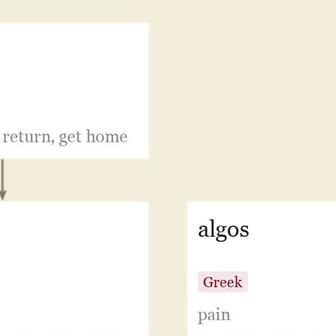Nestor
“Nestor”这个词最早出现在1580年代,指的是一位经验丰富的顾问,或者是一个班级或公司中最年长、最有经验的人。它源自于希腊语中的 Nestōr,这是《伊利亚特》中一位年迈而睿智的英雄、皮洛斯国王的名字,他活了三代人。Klein 认为这个名字的字面意思是“祝福者”,与 nostimos “受祝福的”有关; Watkins 则将其与 nostalgia 的第一个元素的词根联系起来。
nestor 的相关词汇

1726年,“对回家或回到祖国的病态渴望,被视为一种疾病的严重思乡病”,这是现代拉丁语,由学者约翰内斯·霍费尔(1669-1752)在1688年在巴塞尔大学的一篇论文中首次提出,作为德语 heimweh "homesickness"的翻译(参见 home + woe)。
源自希腊语 algos "痛苦,悲伤,困扰"(参见 -algia)+ nostos "回家",来自 neomai "到达某个地方,逃脱,返回,回家",来自 PIE *nes- "安全回家"(与古挪威语 nest "旅行食物",梵文 nasate "接近,加入",德语 genesen "恢复",哥特语 ganisan "治愈",古英语 genesen "恢复"同源)。法语 nostalgie 在1754年的法国军队医疗手册中有记载。
最初是指瑞士人的病症,据说这种病症特别常见于他们,而且经常是致命的,无论是由其自身作用还是与伤口或疾病的结合。
[Dr. Scheuzer] had said that the air enclosed in the bodies of his countrymen, being in Æquilibrium with a rare and light air that surrounds them, was overloaded in lower countries with an air more dense and heavier, which compressing and obstructing the capillary vessels, makes the circulation slow and difficult, and occasions many sad symptoms. [Account of the publication of "Areographia Helvetiæ" in New Memoirs of Literature, London, March 1726]
[Dr. Scheuzer]曾经说过,他的同胞们体内封闭的空气,与环绕他们的稀薄轻盈的空气相比,在低地国家被更密集、更重的空气所压迫,这压迫并阻塞了毛细血管,使血液循环变得缓慢和困难,引发了许多病症。[ "Areographia Helvetiæ" 在新文学回忆录中的出版情况,伦敦,1726年3月]
到了1830年代,这个词被用来形容任何强烈的思乡病:海员的,罪犯的,非洲奴隶的。"风笛在苏格兰军团在海外服役时有时会产生同样的效果" [Penny Magazine," 1840年11月14日]。它被列在"实用医学百科全书" [伦敦,1833年,由三位医学博士编辑]中的"地方性疾病"中,定义为"那些离开祖国的人有时会产生的压抑症状,当他们被强烈的回家、回到朋友和青春时代的场景的渴望所困扰时...."
这主要是一个军事医学诊断,北方在美国内战中认为这是一个严重的医学问题:
In the first two years of the war, there were reported 2588 cases of nostalgia, and 13 deaths from this cause. These numbers scarcely express the real extent to which nostalgia influenced the sickness and mortality of the army. To the depressing influence of home-sickness must be attributed the fatal result in many cases which might otherwise have terminated favorably. ["Sanitary Memoirs of the War," U.S. Sanitary Commission, N.Y.: 1867]
在战争的前两年,报告了2588例思乡病,以及13例因此原因死亡。这些数字几乎无法表达思乡病对军队疾病和死亡率的真正影响。许多本来可能有望康复的病例,由于家乡的压抑影响,结果却是致命的。["战争卫生回忆录," U.S. Sanitary Commission, N.Y.: 1867]
转义意义(主要的现代含义)"对过去的怀旧之情"在1920年被记录下来,可能源于法国文学中对 nostalgie 的使用。对远方的渴望也必然涉及到时间的分离。
在教会历史上(公元15世纪中期),指 Nestorius 的信条和追随者(Nestor 的拉丁化形式),他是拜占庭帝国的第五个牧首,他的教义将基督区分为不同的神性和人性,被判定为异端,并导致了一次分裂。尼斯多禄教派在波斯和附近地区一度持续存在。源自晚期拉丁语的 Nestorianus,来自希腊语 Nestōrios 。早期称作 Nestorine (约公元1400年)。作为形容词的意思始于公元1500年左右。相关词汇: Nestorianism 。